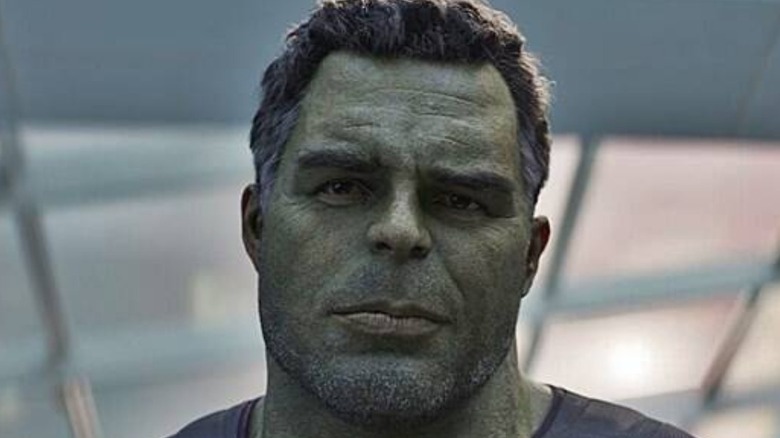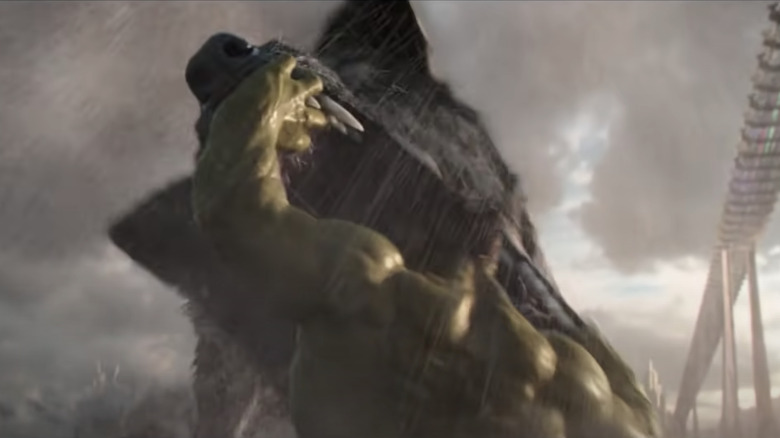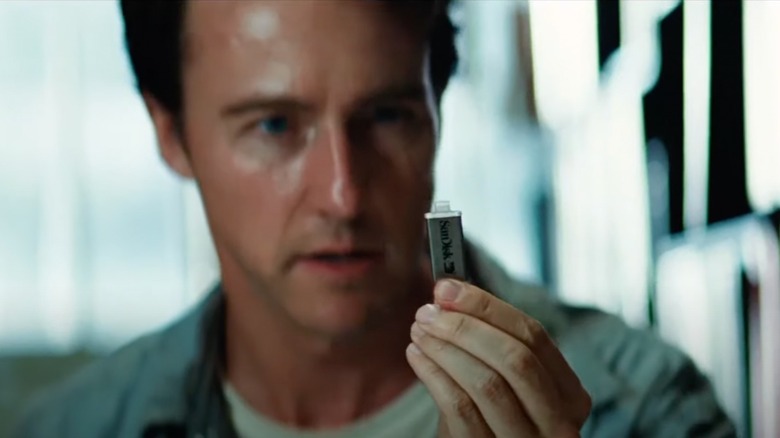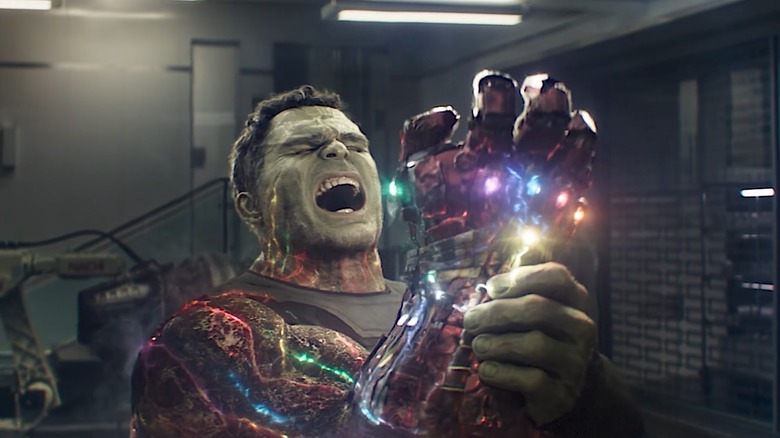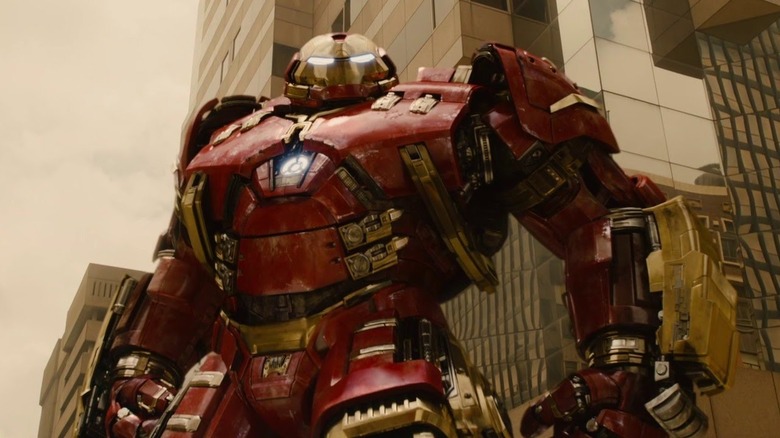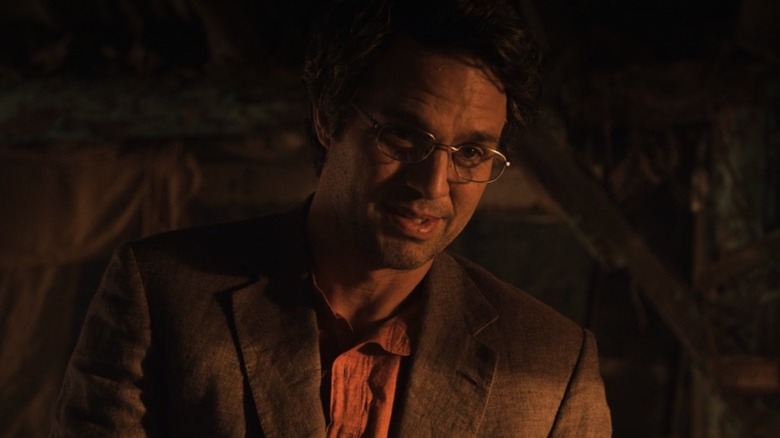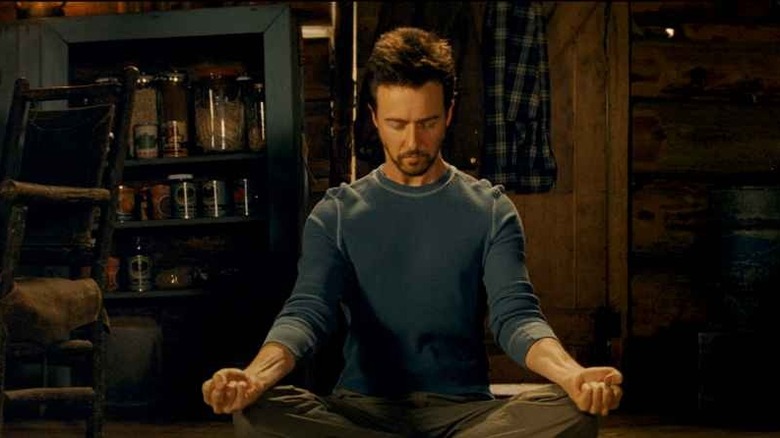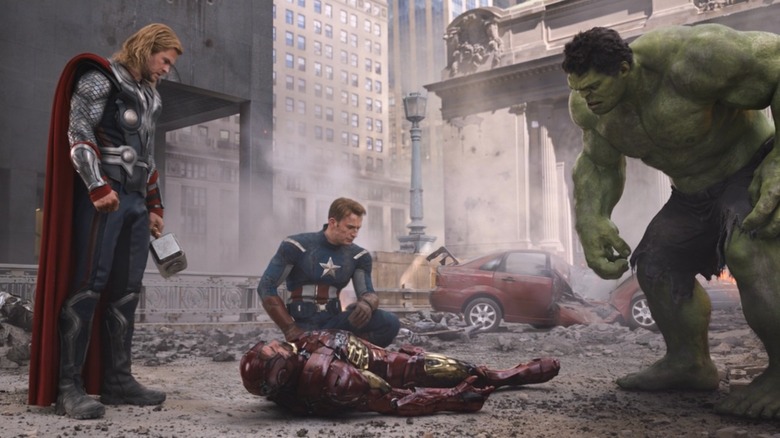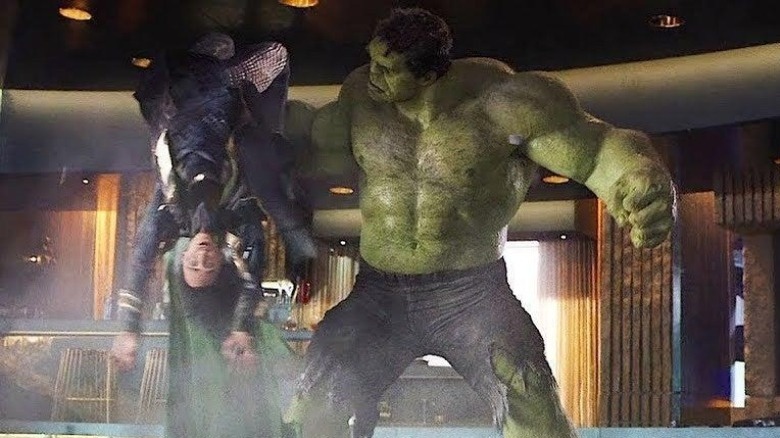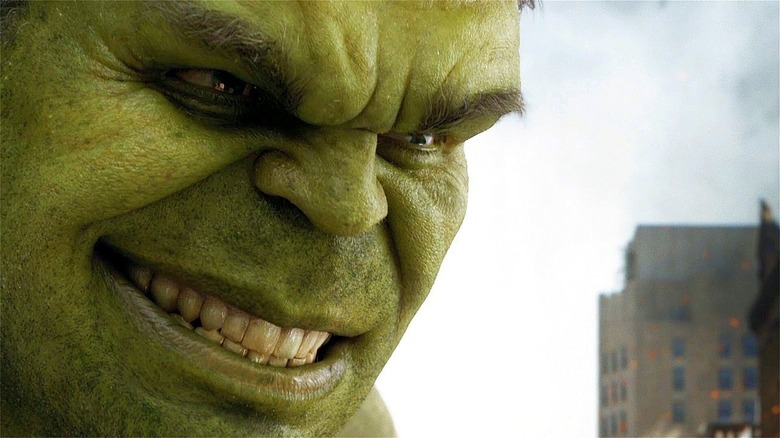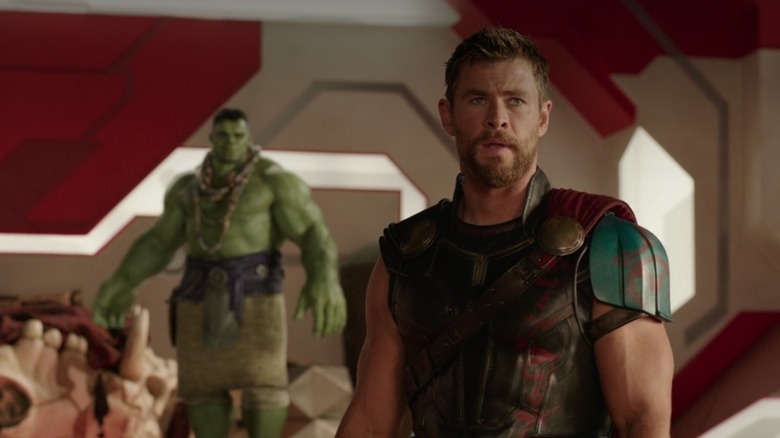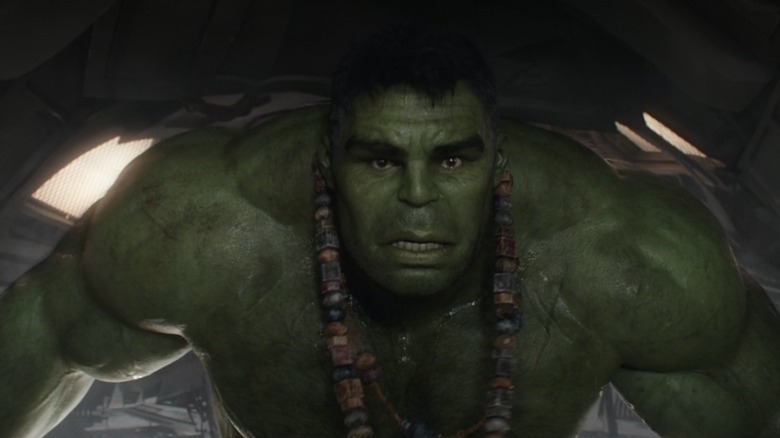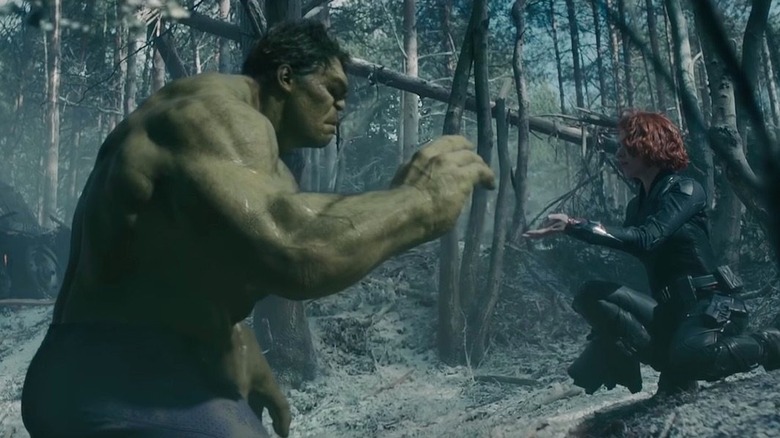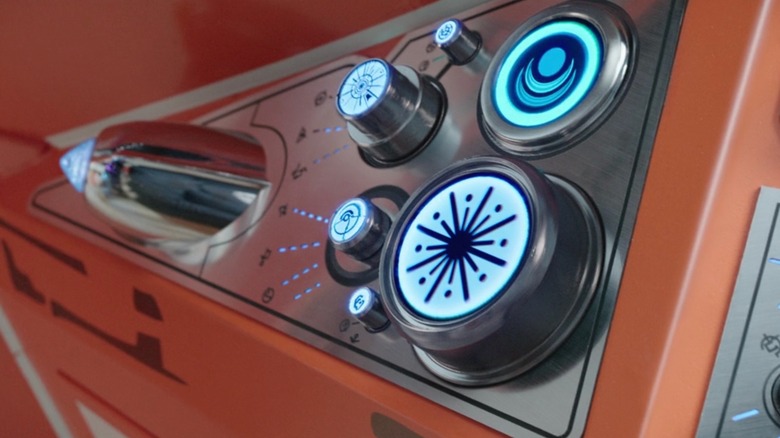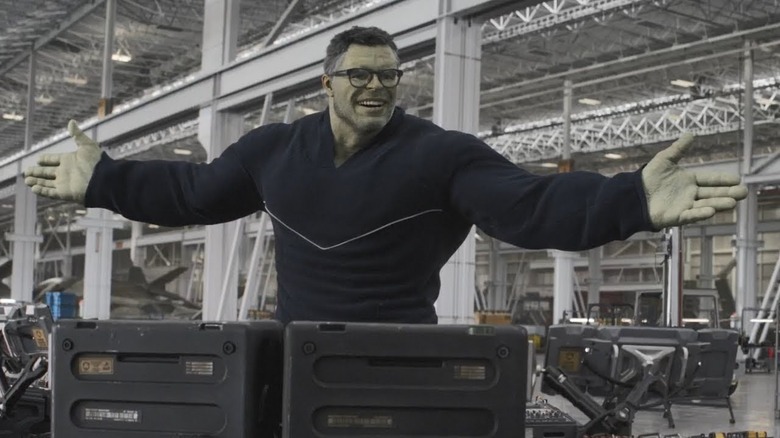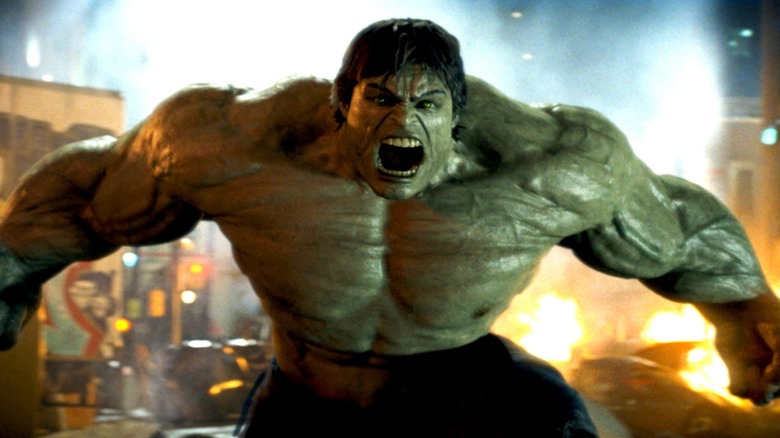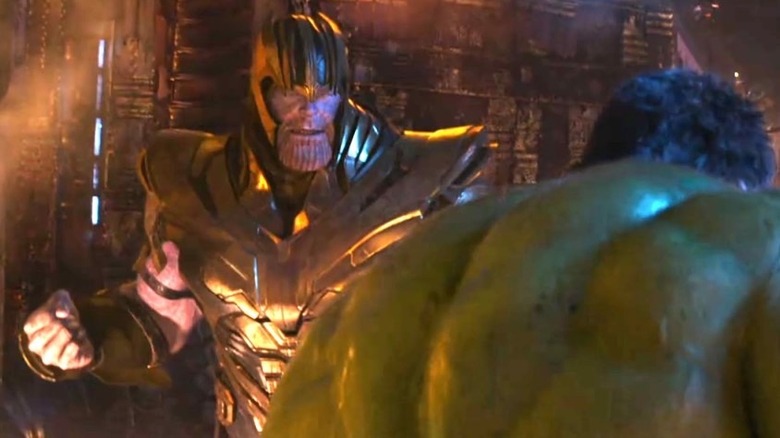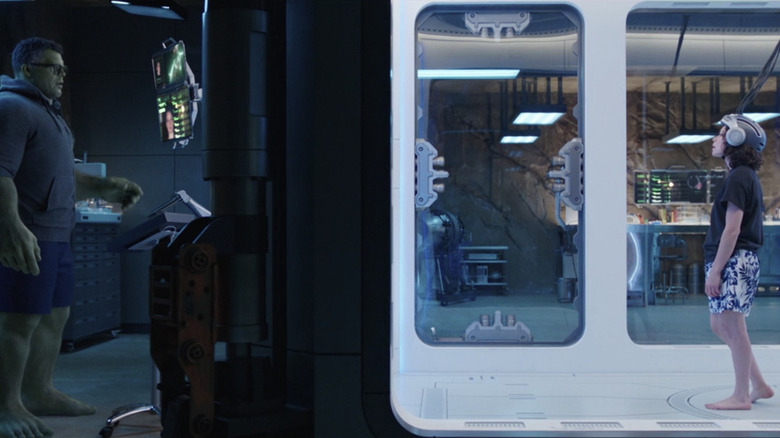The Best Decisions The Hulk Made In The MCU
Of all the heroes introduced so far in the MCU, the Hulk probably isn't the first you'd pick for any "Best Decision Maker" awards. After all, between Bruce Banner and his big green alter ego, the Hulk's decisions have (at least in part) resulted in death and destruction in Johannesburg, the creation of Ultron, an abandonment of Earth at the end of 2015's "Avengers: Age of Ultron," and a completely unnecessary — but admittedly epic — throwdown with the eponymous thunder god in 2017's "Thor: Ragnarok."
But in spite of most versions of the Hulk not being cerebral champions, the truth is that both Bruce Banner and the "Other Guy" have made some pretty good decisions over the course of Marvel's cinematic narrative, including ones that have helped decide the fate of the universe. Here, by our estimation, are the best decisions with which either Bruce Banner or the Hulk should be credited.
Bruce Banner risked his existence to take out Fenris
With everything that's happened in the MCU since, it seems like the risk Bruce Banner took by choosing to transform into the Hulk at the end of "Thor: Ragnarok" has been all but forgotten. When he transforms back to his human self on Sakaar and learns he's been the Hulk for a full two years, he's understandably concerned that if he ever becomes the Hulk again, the change could be permanent. Because of that, he goes to Asgard with Thor and Valkyrie (Tessa Thompson), with the understanding that they'll have to deal with Hela without the Hulk's help.
But, when Fenris charges the fleeing Asgardians on the Bifrost, Bruce realizes he's their only hope. Hulk takes the giant, undead wolf out of the fight, and to her eventual second death. Not only do his actions potentially save Heimdall — whose survival is integral to the heroes' eventual victory in their fight with Thanos — but he saves a lot of Asgardians who no doubt later come to the Avengers' aid at the end of 2019's "Avengers: Endgame."
Bruce Banner swallowed a tough pill
You've got to imagine that if you're Bruce Banner — at least, before his merging of body and mind as the Professor Hulk — it would be hard to hold on to any kind of physical belongings. We see this multiple times in the MCU, when the scientist struggles to find clothes after his shift into the Hulk has left those he was wearing in tatters.
But when he's cornered by the forces of Thaddeus Ross on the Culver University campus in 2008's "Incredible Hulk," he knows there's a really good chance the soldiers are about to draw out the "Other Guy." While he can get new clothes, he can't afford to lose the data on the thumb drive he carries. So he makes the difficult, gross, and physically daunting decision to swallow it.
You could make a valid argument this was not a good decision; after all, while Banner gets the data to Sam Sterns (Tim Blake Nelson), not only is the renegade scientist unsuccessful in curing Bruce permanently, but he uses the data to help turn Emil Blonsky (Tim Roth) into the Abomination and possibly himself into the Leader (should he ever return). But without that data, Bruce and Betty (Liv Tyler) would have had no clear path going forward. They'd be forced to look for another solution, which could lead to their imprisonment or deaths.
Hulk brought back half the universe in Endgame
When it came time to undo the death that Thanos wrought in "Avengers: Infinity War," the Hulk was the only true choice when it came to who could use the Stones and survive the experience.
You can bicker back and forth about who the most powerful Avenger is, but in this case it doesn't matter. Is Thor more powerful than the Hulk? Perhaps, but on one hand he isn't fueled by the same radiation the Stones emit, but the Hulk is. On the other, everyone can agree Thor wasn't in the best emotional or mental state in "Endgame." Who knows what he might have unwittingly made happen if he snapped while in his depressed, likely intoxicated mindset? Captain Marvel wasn't on Earth and the Avengers had no way to contact her. Wanda and Doctor Strange were dead.
While he paid for the decision dearly — and the MCU is still reeling from the after-effects of having half its population reappear after five years — it had to be done, and the Hulk was the only one who could do it.
He helped design the Hulkbuster armor
It is often forgotten that when the Hulk fought Iron Man in "Age of Ultron," in a way, he was fighting himself. When the audience first hears about Tony Stark's Hulkbuster suit, with the codename "Veronica," Bruce reminds his friend that he helped design the armor. It makes sense — no one wants safeguards against a Hulk rampage more than Bruce Banner.
Since engineering isn't really Banner's area of expertise, it isn't clear exactly how he helped, but if nothing else he probably had plenty of input regarding the Hulk's strengths, and recommendations on different devices Tony could use to counteract them. There's the gas Tony used to try to knock the Hulk out, the device in his gauntlet that allowed him to latch on to the Hulk's wrist and carry him into the air, and the cage that briefly subdues the Hulk while "Veronica" makes its way to Tony. All of these could've been ideas proposed by Bruce, then built by Stark.
He went into hiding
While he may have done it mainly for himself, the world needed Bruce Banner to go into hiding at the end of "Incredible Hulk."
No amount of gratitude on General Ross' part would have stopped him, after the Abomination's defeat, from imprisoning Banner and using him for his own agenda. The General Ross of the MCU is not a completely bad person, but as we see both in "Incredible Hulk" and subsequent appearances, he sees the Hulk and other superheroes, at best, as tools at his disposal. He wouldn't have allowed Banner to go free just because the Hulk saved the lives of him and his daughter.
Ross isn't the only one who wanted to use the Hulk. When she approaches Banner in 2012's "Avengers," Black Widow says S.H.I.E.L.D. has been keeping "other interested parties" off the Hulk's trail. There's no shortage of dangerous "interested parties" in the MCU, and no shortage of evil they could do with the Hulk in their control.
Learning meditation helped the Hulk evolve
When we first encounter Bruce Banner in "Incredible Hulk," he's hiding out in Brazil, looking for a cure, and teaching himself relaxation methods in the hopes of preventing another Hulk-out. Sure, his breathing techniques don't stop him from turning into the Hulk in the bottling factory, but ultimately that's a good thing since as the Hulk, he's impervious to everything Emil Blonsky and his team have to throw at him. More importantly, it helps him evolve.
By the end of the film, we see Bruce assume a traditional meditation position but, rather than trying to prevent his change into the Hulk, he willingly triggers a Hulk-out. This is the beginning of Banner's acceptance of the Hulk as a part of himself, which ultimately leads to the creation of the Professor Hulk. This is also why, in "Avengers," he's able to intentionally transform after delivering his now classic revelation: "I'm always angry."
He saved Iron Man in Avengers
Just as the Hulk was the only character who could bring back those Thanos had killed, in "Avengers" he was the only one who could save Iron Man when was falling, unconscious, from the sky.
While Thor could fly with the help of Mjolnir, he needed time to "rev up," and it didn't look like that was time Iron Man had. By the end of "Age of Ultron," the roster would have additional flyers including Vision, Falcon, and War Machine — any of which would have been helpful in saving Tony. But in the first "Avengers" flick, the Hulk was all they had.
Sure, Iron Man would eventually sacrifice himself in "Endgame." But it isn't tough to imagine how different the MCU would look if he'd left his friends 11 years earlier.
He took Loki out of the Battle of New York
Physically speaking, Loki wasn't the biggest threat in the Battle of New York. As soon as the Tesseract opened the portal to the Chitauri, Loki had succeeded in doling out more damage than he could ever possibly do in a one-on-one match against any of the Avengers.
But that doesn't mean the Hulk's thrashing of Loki didn't do a lot of good in the battle. As we see when Thor arrives in New York, Loki was able to give Thor a decent fight. Every second Thor was focused on Loki was a second the thunder god wasn't taking out Chitauri. Left to his own devices, Loki could've either distracted or perhaps even killed another Avenger.
Instead, once the Hulk eliminates him from the fight in one of the most epic, thorough, and utterly hilarious take-downs in cinematic history, Loki i content to remain in the crater the Hulk carves out of the floor with his body until the battle is over.
He returned to New York
Banner's "I'm always angry" line, followed by his beautiful one-shot kill of one of the Chitauri leviathans, is one of the most iconic moments of "Avengers," and perhaps of the entire MCU narrative. Not only does he take out one of the massive beasts — the first to fall in the battle — but this is the moment the Avengers become more than just a random collection of superheroes. This is the moment the Avengers become an actual team. None of that would've been possible if Bruce Banner had taken that motorbike in the opposite direction.
It is no mistake that moments before Banner finds the other heroes in New York, they have once again began bickering among themselves, this time over who gets to take a chunk out of Loki. It's Banner's arrival, and that of the Hulk on their side this time, that makes everything click.
He helped Thor connect with Valkyrie
The Hulk didn't want anything to do with Thor's "Revengers." He was happy on Sakaar, with his every material need and desire cared for, while enjoying the adoration of an entire world's populace as a champion warrior. But he also wanted to keep his friend Thor happy, so when Thor asked him to summon Valkyrie, the Hulk obliged. And when Valkyrie tried to leave, Hulk stopped her by hurling half a giant skull's jaw in her path.
Without Hulk helping Thor with Valkyrie, the heroes may have never left Sakaar. While Thor wasn't able to convince Valkyrie of anything purely with words, he was able to sneak the slave disc controller off her, which allowed him to escape the tower and find the Quinjet. Of course, he never managed to get said Quinjet off the ground — but even there, the green guy managed to unintentionally help.
He chased Thor
One of the most endearing things Hulk does in the MCU is destroy a Quinjet. Of course, destroying the thing wasn't the point. All Hulk wants to do when he chases Thor in "Ragnarok" is to stop his friend from leaving. He yells to Thor, "Friend, stay!" He doesn't even seem to be destroying the Quinjet on purpose — he just isn't particularly careful.
The act of chasing Thor to the Quinjet brings back Bruce Banner for the first time in two years. When his entrance somehow triggers Black Widow's unanswered message calling him back home, it reaches whatever part of Bruce Banner is still awake and triggers the change back to his more human half.
From any purely self-serving point of view, the Hulk had no reason to leave Sakaar. In the Contest of Champions, he felt accepted and even applauded for doing what he was hated for on Earth: smashing. Without changing back to Banner after chasing Thor, the Hulk never would've made it to Asgard, Earth, or perhaps anywhere else.
He grew closer to Black Widow
There are a lot of bizarre things about the relationship between Black Widow and the Hulk. Ultimately it may be best that things didn't work out between them. But, at the same time, it's arguably also for the best that, for a time, they grew as close as they did.
When we first meet the MCU's Bruce Banner, he's haunted with the belief that he's denied any kind of so-called "normal" life. By getting closer to Natasha, he sees a light at the end of the tunnel. No, they never really become a couple, but it's easier for him to believe it's possible.
Not to mention the relationship between the two likely had a profound impact on how the rest of the team saw the Hulk. Seeing that it was possible for someone to interact with him nonviolently, even to trigger his change back to Banner, it probably did a lot to help the rest of the team trust Bruce.
In Ragnarok, he hit the party button
While Bruce Banner has a lot more reasons to leave Sakaar than the Hulk does, he doesn't have a lot to offer as the heroes escape Sakaar. At least, not at first.
While Valkyrie and Thor take out one ship after another, Banner is left to fly the Grandmaster's ship without any weapons to protect him from Topaz. He hits a big button he's sure must trigger some sort of weapon — only to discover it's the "party" button.
Rather than setting off a weapon, the button triggers a lot of loud, electronic music and a salvo of colorful fireworks. The fireworks do nothing to directly hurt Topaz or her ship, but they nevertheless manage to kill her. She's dazzled by the display and, distracted, crashes her vessel into the side of an abandoned ship sticking out of the water. Rest in pieces, Topaz.
He helped the Avengers travel through time
Bruce Banner is not as good at figuring out time travel as Tony Stark, that's for sure. If no one else is willing attest to that, Scott Lang — who learned much more about being an infant, an adolescent, and an old man than he wanted to in a very short span — would be willing to say a few words on the subject.
But, what if Banner hadn't tried his best? Well, if nothing else, Banner's failed attempts to perfect time travel helped prepare him for one of his most important jobs after Thanos was finally defeated — using time travel to send Captain America into the past to replace the Infinity Stones. Tragically, Tony is forced to sacrifice himself to defeat Thanos and wouldn't have been able to do it himself. While there are other genius scientists around like Hank Pym and Shuri once the smoke clears, the Hulk is the only one who is a regular member of the Avengers.
He defeated the Abomination
In 2008's "Incredible Hulk," there was no one else who could stop Abomination's rampage through Harlem but the Hulk. Even if anyone could have contacted Iron Man, he would likely have been multiple states away and unable to make it before lives were lost — not to mention, it would be years before he'd develop the sort of suit that could tangle with a gamma-powered villain. Thor was in Asgard, Captain America was still frozen, and Captain Marvel was light years away. It had to be the Hulk.
Sadly, it speaks to Banner's own struggles with guilt and shame that when he refers to his battle with Blonsky in "Avengers," he talks about how he "broke Harlem." Sure, his tussle with Blonsky damaged the area, but there would have been a lot more destruction if he hadn't intervened. The Hulk may very well have saved not only Harlem but, considering the unlikelihood of Ross stopping the monster without superhero help, the entirety of New York.
He fought Thanos
When the Hulk fought Thanos, things didn't go the way he expected. Accustomed to the kinds of enemies he could easily dominate, the Hulk was defeated by the Mad Titan.
But, while losing wasn't a part of the Hulk's plan, it was ultimately a good thing. Hulk's defeat at the hands of Thanos created an opportunity for Heimdall. Paying for the act with his life, Heimdall was able to briefly summon the power of the Bifrost to transport the Hulk to Earth. If Hulk hadn't fought Thanos and been defeated, Heimdall's only choices for a messenger to send to Earth would've been Thor, Loki, or himself. Heimdall was critically injured and completely unknown to the heroes of Earth. Heimdall likely didn't trust Loki and, even if he did, the heroes of Earth certainly wouldn't put much stock in his words. Thor, meanwhile, was restrained by Ebony Maw.
The Hulk was the only one of the assembled heroes who could survive to warn the Earth of the imminent arrival of Thanos — and who had the credibility to be believed.
He helps create She-Hulk
With Disney+'s "She-Hulk," much should be revealed about how Jennifer Walters undergoes her transformation; at least one Marvel comic may give us insight on how Mark Ruffalo's Hulk will feel about helping to make his cousin into a monster.
As punishment for trying to warn a past version of Hawkeye that he was about to die, the Time Variance Authority put She-Hulk on trial in 2005's "She-Hulk" #3, with a guilty verdict possibly resulting in her permanent deletion from history. While plenty of figures from the life of Jennifer Walters (played by Tatiana Maslany in the series) are invited to testify on her behalf, one person shows up without an invite: the Hulk.
Often poorly regarded in these comics, this Hulk is very different than Ruffalo's version in the MCU. In fact, as soon as he walks into the TVA's courtroom, the Thing jumps up to stop him, but is in turn is stopped by Reed Richards. In front of the judges, the Hulk calls himself "a curse on humanity." But, he says, by giving his blood to his cousin, he "had a hand in creating a hero."
Hulk goes so far as to say that "some days" it's the only thing that's made his life "worthwhile." Will the series follow a similar gameplan? It seems quite possible.
